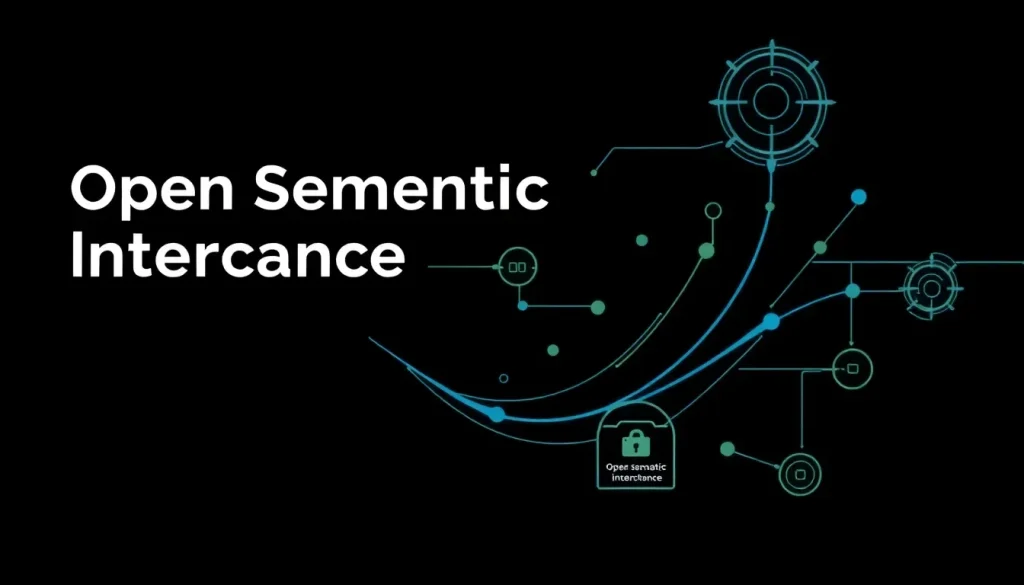Open Semantic Interchange OSI Overview and Benefits

As organizations increasingly rely on artificial intelligence (AI) and business intelligence (BI), the need for effective data management becomes paramount. The Open Semantic Interchange (OSI) initiative is stepping up to address these challenges by offering a universal framework that standardizes data semantics across the industry. This article explores the significance of OSI, its implications for businesses, and how it aims to revolutionize data interoperability.
Understanding the Open Semantic Interchange Initiative
The OSI is an open-source project launched in 2025, designed to establish a common semantic data framework that all companies can adopt. Its primary goal is to standardize fragmented data definitions, which have long been a significant barrier to AI adoption and integration. By creating a vendor-neutral specification, OSI ensures that all data-driven tools can communicate seamlessly.
This initiative is particularly vital in today's digital landscape, where organizations utilize diverse technologies from various vendors. Without a common semantic framework, data and AI teams often find themselves entangled in discrepancies, spending excessive time reconciling conflicting definitions. The OSI aims to alleviate this issue by fostering a shared understanding of data semantics.
The Challenges of Fragmented Data Definitions
Data fragmentation poses several challenges for organizations, including:
- Increased Time and Resources: Teams waste weeks reconciling conflicting data definitions, leading to inefficiencies.
- Inaccurate Insights: Inconsistencies in data can result in misleading analytics, affecting decision-making processes.
- Integration Difficulties: Merging data from different sources becomes cumbersome without a standardized framework.
These challenges highlight the necessity of a universal semantic standard. By establishing clear definitions and protocols, OSI seeks to provide companies with the tools needed to ensure that data is governed effectively and remains context-rich.
Benefits of the Open Semantic Interchange Framework
The OSI framework offers numerous advantages for businesses, particularly those looking to leverage AI and analytics more effectively:
- Semantic Consistency: A unified standard ensures that all AI, BI, and analytics tools speak the same language, fostering better collaboration.
- Flexibility in Technology Adoption: Companies can integrate best-of-breed technologies without compromising the integrity of their data metrics.
- Accelerated AI Adoption: With clearer definitions, organizations can implement AI solutions more quickly, enhancing their competitive edge.
By addressing these key areas, OSI aims to transform how businesses manage and interpret their data, making AI insights more accurate and trustworthy.
Key Players Behind OSI
The OSI initiative was founded by a coalition of industry leaders committed to advancing data interoperability. This includes:
- ThoughtSpot: A leader in analytics that emphasizes data discovery.
- Snowflake: Renowned for its cloud data warehousing capabilities.
- Salesforce: A major player in customer relationship management (CRM).
- BlackRock: A global investment management corporation.
- dbt Labs: Innovators in analytics engineering.
- RelationalAI: Focused on relational data management.
This diverse consortium of organizations brings a wealth of expertise and resources to the OSI initiative, enhancing its potential for widespread adoption.
How OSI Facilitates Data Governance
Effective data governance is crucial for ensuring the accuracy and reliability of insights derived from AI and analytics. The OSI framework promotes robust data governance through:
- Standardized Definitions: Clear and consistent definitions help eliminate ambiguity in data interpretation.
- Interoperability: Ensures that different systems can work together seamlessly, facilitating data exchange.
- Enhanced Collaboration: Teams can work together more effectively when they share a common understanding of data semantics.
This approach not only streamlines operations but also builds trust in the data being used for critical business decisions.
The Future of Data Interoperability and AI
As organizations continue to embrace AI and advanced analytics, the demand for consistent and reliable data will only grow. The OSI initiative is poised to lead this charge by fostering an environment where:
- Data Silos are Broken Down: By creating a universal standard, OSI encourages the free flow of data across platforms.
- AI Models are More Trustworthy: With standardized data, AI models can produce more accurate and reliable outcomes.
- Innovation is Accelerated: A common framework allows for faster development and deployment of new AI solutions.
With the backing of prominent organizations and a clear vision for the future, the OSI initiative aims to redefine how businesses approach data management, making it an essential component of the AI landscape.
Exploring Additional Insights
For those interested in a deeper understanding of the OSI initiative and its implications, a variety of resources are available. One such resource is a video discussing the OSI's role in defining open-source AI, which can provide further context and insights:
By exploring these resources, businesses can better prepare for the future of data interoperability and AI-driven solutions.




Leave a Reply